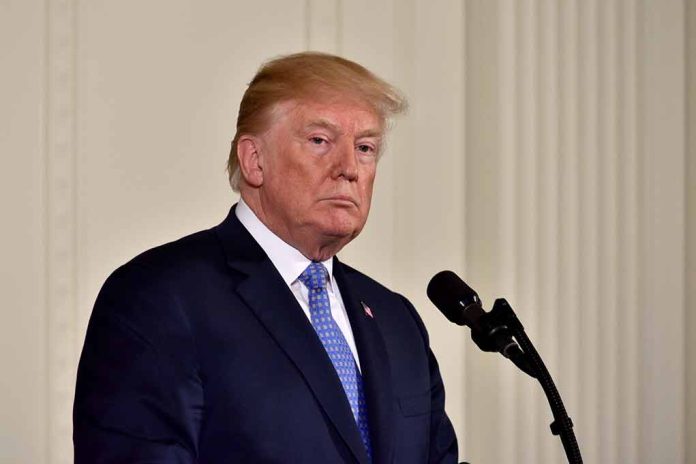
President elect Donald Trump proposes a new “External Revenue Service” to collect tariffs and duties, potentially reshaping U.S. trade policy.
At a Glance
- Trump plans to create an “External Revenue Service” to collect tariffs and duties
- The proposed agency would be a counterpart to the Internal Revenue Service
- Trump aims to impose significant tariffs on major trading partners and global imports
- Economists and lawmakers warn of potential negative impacts on consumers and businesses
Trump’s Vision for a New Revenue Collection Agency
President elect Donald Trump has unveiled plans for a new federal entity called the “External Revenue Service” (ERS) to handle the collection of tariffs and duties on imports and exports. This proposed agency would serve as a counterpart to the Internal Revenue Service, focusing on revenue from foreign sources.
Trump’s announcement, made on his Truth Social platform, outlines his vision for the ERS as a key component of his economic policy. The president elect stated, “Through soft and pathetically weak Trade agreements, the American Economy has delivered growth and prosperity to the World, while taxing ourselves. It is time for that to change.”
Proposed Tariffs and Economic Impact
As part of his plan, Trump aims to impose significant tariffs on major trading partners and global imports. These include a 25% tariff on imports from Canada and Mexico, a 10% tariff on global imports, and a 60% tariff on Chinese goods. The president elect argues that these measures will address trade imbalances and ensure that foreign entities pay their “fair share.”
“We will begin charging those that make money off of us with Trade, and they will start paying, FINALLY, their fair share.” – Donald Trump
However, economists and trade experts have expressed concerns about the potential consequences of such aggressive tariff policies. They warn that these measures could disrupt trade flows, increase costs for American consumers and businesses, and potentially provoke retaliatory actions against U.S. exports.
Legislative Challenges and Political Landscape
The creation of a new federal agency like the ERS would require congressional approval, as the power to establish such entities lies with Congress, not the President. This presents a potential hurdle for Trump’s plan, although Republicans currently hold a majority in both the House and Senate.
“No amount of silly rebranding will hide the fact that Trump is planning a multi-trillion-dollar tax hike on American families and small businesses to pay for another round of tax handouts to the rich” – Oregon Sen. Ron Wyden
Democratic lawmakers have already voiced their opposition to the plan. Oregon Senator Ron Wyden criticized the proposal, suggesting that it would result in a substantial tax increase on American families and small businesses. This opposition highlights the potential for a contentious legislative battle over the creation of the ERS and the implementation of Trump’s tariff policies.
Broader Economic Strategy
Trump’s proposed External Revenue Service is part of a larger economic strategy that includes other initiatives aimed at reducing government size and regulations. The president elect has appointed Elon Musk and Vivek Ramaswamy to lead the Department of Government Efficiency (DOGE), a task force focused on streamlining federal operations.
While Trump’s supporters view these measures as necessary steps to protect American interests and boost domestic manufacturing, critics argue that they could lead to increased inflation and economic disruption. As the debate over the External Revenue Service and associated tariff policies continues, it remains to be seen how these proposals will shape the future of U.S. trade relations and economic policy.
Sources:
- Trump Says He Wants To Establish ‘External Revenue Service’ To Collect Tariff Money
- More trouble for US trade partners? Trump to set up new department to collect “tariffs, duties, and all revenue” from foreign sources – The Economic Times
- World News | Will Create ‘External Revenue Service’ Agency to Collect Tariff Income: Trump | LatestLY



